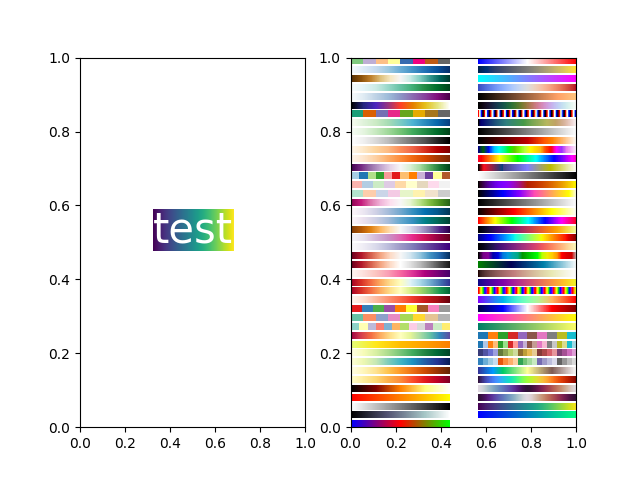Note
Click here to download the full example code
BboxImage Demo#
A BboxImage can be used to position an image according to
a bounding box. This demo shows how to show an image inside a text.Text's
bounding box as well as how to manually create a bounding box for the image.
import matplotlib.pyplot as plt
import numpy as np
from matplotlib.image import BboxImage
from matplotlib.transforms import Bbox, TransformedBbox
fig, (ax1, ax2) = plt.subplots(ncols=2)
# ----------------------------
# Create a BboxImage with Text
# ----------------------------
txt = ax1.text(0.5, 0.5, "test", size=30, ha="center", color="w")
kwargs = dict()
bbox_image = BboxImage(txt.get_window_extent,
norm=None,
origin=None,
clip_on=False,
**kwargs
)
a = np.arange(256).reshape(1, 256)/256.
bbox_image.set_data(a)
ax1.add_artist(bbox_image)
# ------------------------------------
# Create a BboxImage for each colormap
# ------------------------------------
a = np.linspace(0, 1, 256).reshape(1, -1)
a = np.vstack((a, a))
# List of all colormaps; skip reversed colormaps.
cmap_names = sorted(m for m in plt.colormaps if not m.endswith("_r"))
ncol = 2
nrow = len(cmap_names) // ncol + 1
xpad_fraction = 0.3
dx = 1 / (ncol + xpad_fraction * (ncol - 1))
ypad_fraction = 0.3
dy = 1 / (nrow + ypad_fraction * (nrow - 1))
for i, cmap_name in enumerate(cmap_names):
ix, iy = divmod(i, nrow)
bbox0 = Bbox.from_bounds(ix*dx*(1 + xpad_fraction),
1. - iy*dy*(1 + ypad_fraction) - dy,
dx, dy)
bbox = TransformedBbox(bbox0, ax2.transAxes)
bbox_image = BboxImage(bbox,
cmap=cmap_name,
norm=None,
origin=None,
**kwargs
)
bbox_image.set_data(a)
ax2.add_artist(bbox_image)
plt.show()
References
The use of the following functions, methods, classes and modules is shown in this example:
